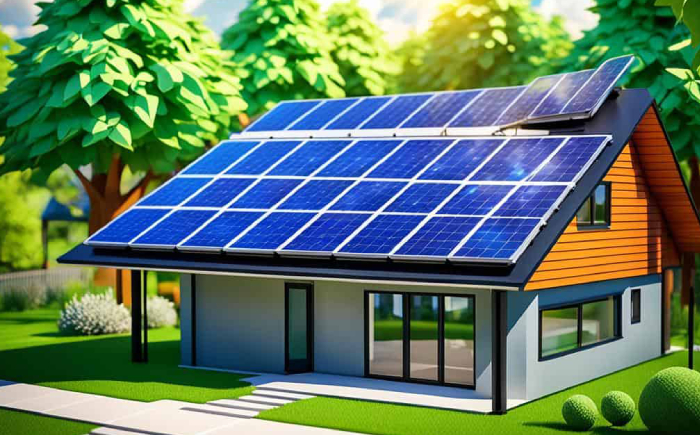The Future of Energy: How Solar Power is Revolutionizing Home Sustainability
As the world faces growing environmental challenges and the need for sustainable energy sources becomes increasingly urgent, solar power is emerging as a game-changer for home sustainability. Solar energy, harnessed from the sun, is a clean, renewable resource that offers homeowners a way to reduce their reliance on traditional energy grids while lowering their carbon footprint. As technology continues to evolve and become more affordable, solar power is no longer just a futuristic solution but a present-day reality that is revolutionizing the way we power our homes.
1. Reducing Carbon Footprint and Environmental Impact
One of the most significant benefits of solar power is its ability to reduce the carbon footprint of homes. Unlike fossil fuels, solar energy generates no greenhouse gases or pollutants, making it a clean and environmentally friendly energy source. By installing solar panels, homeowners are actively contributing to a cleaner environment and reducing their reliance on energy from non-renewable resources. This shift toward solar energy aligns with global efforts to combat climate change and reduce the environmental impact of traditional energy consumption, making it a vital part of the future of energy sustainability.
2. Energy Independence and Reliability
As homeowners become more aware of the instability of energy prices and the vulnerability of traditional power grids, solar power offers a sense of energy independence. By generating their own electricity, homeowners are less dependent on utility companies and less affected by fluctuations in energy prices. Solar power also provides greater reliability, especially in areas prone to power outages or natural disasters. With a solar energy system in place, homes can continue to function even when the grid goes down, especially when combined with battery storage systems that store excess energy for later use. This reliability is a key factor in making solar power an attractive long-term energy solution.
3. Technological Advancements Making Solar More Affordable
In recent years, advancements in solar technology have made it more affordable and accessible for homeowners. The cost of solar panels has decreased significantly, and new innovations in panel efficiency, energy storage, and installation methods have further lowered the barriers to entry. With government incentives, tax credits, and rebates available in many regions, the initial investment in solar power has become more manageable for homeowners. As technology continues to improve, solar power will only become more cost-effective, making it an even more appealing option for those looking to invest in sustainable home energy solutions.
4. Increasing Property Value and Appeal
Solar panel installation is not only a smart environmental choice but also a smart financial decision. Homes with solar energy systems tend to have higher resale values and are more attractive to potential buyers. Many buyers today are looking for energy-efficient homes that can help them save on utility bills, and solar power offers a clear advantage in this regard. Studies have shown that homes with solar panels often sell faster and at a higher price than comparable homes without them. As sustainability becomes an increasingly important factor for homebuyers, solar power adds significant value to a property, making it a worthwhile investment for homeowners.
5. Integrating Solar with Other Sustainable Home Technologies
Solar power is often just one part of a broader movement toward sustainable home design. As more homeowners embrace green living, solar energy is increasingly being integrated with other sustainable technologies such as energy-efficient appliances, smart thermostats, and home automation systems. These technologies work together to create a home that is not only powered by renewable energy but is also designed to minimize energy waste. This holistic approach to sustainability reduces overall energy consumption, increases efficiency, and enhances the home’s environmental impact. As solar power technology continues to advance, we can expect more innovative solutions that integrate solar with other green technologies, further enhancing the sustainability of homes.
6. Long-Term Cost Savings and Financial Benefits
Although the initial installation of a solar energy system requires an investment, the long-term financial benefits are substantial. By producing their own electricity, homeowners can significantly reduce their monthly utility bills, and in some cases, eliminate them entirely. Solar panels can pay for themselves over time through these energy savings, with many systems recouping their cost in just 7 to 10 years. Additionally, solar power can provide long-term financial security, as homeowners are shielded from rising energy costs and are less affected by fluctuating utility rates. With the added benefit of tax credits, rebates, and incentives, the financial return on investment for solar energy continues to improve, making it a smart economic choice for homeowners.
Solar power is rapidly transforming the landscape of home energy use, offering homeowners a sustainable, cost-effective, and environmentally friendly way to power their homes. With its ability to reduce carbon footprints, provide energy independence, and offer long-term cost savings, solar energy is a key component of the future of home sustainability. As technology advances and costs continue to decrease, solar power will become even more accessible, revolutionizing the way we approach energy use in our homes. Whether driven by environmental concerns or financial benefits, switching to solar power is an investment in a cleaner, more sustainable future for generations to come.
